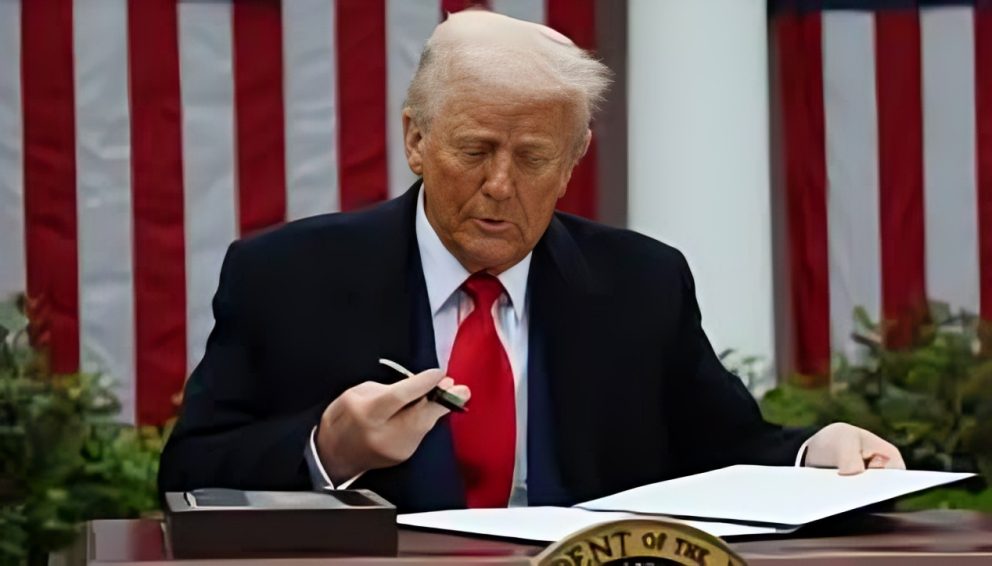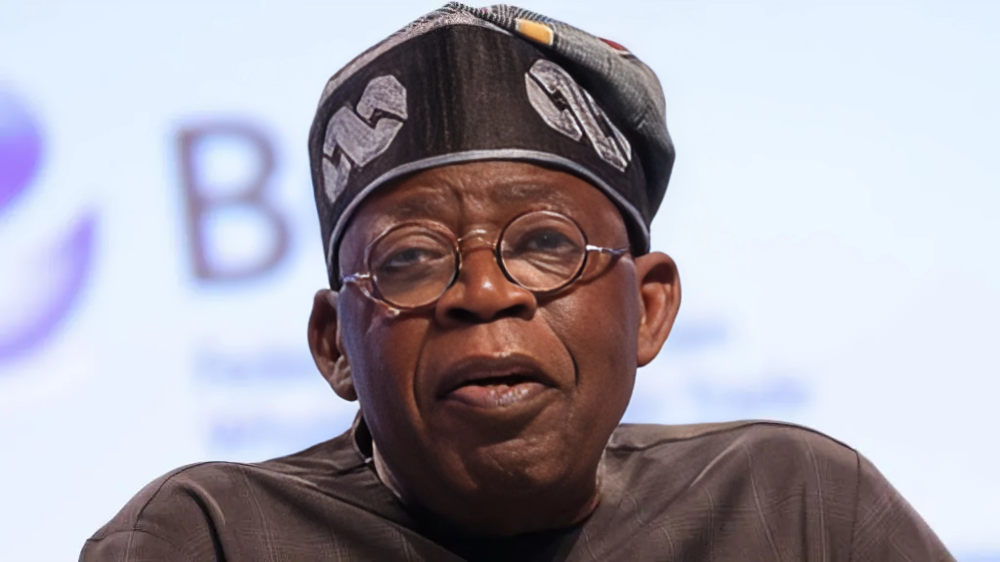
Photo from gstatic
The latest 14 per cent tariff introduced by the US President, Donald Trump, on Nigerian companies' exports represents a significant danger to the $10bn annual exports to the United States, with the potential to undermine the key areas of oil export and agricultural trade, according to experts and trade associations who fear a potential global trade war on Thursday.
The economic experts, in a separate interview with The PUNCH, noted that the policy, which would make goods and services more expensive to consumers, would erode the standard of living, cut down manufacturing activities, distort international trade and consequently destabilize the demand for Nigerian oil in the US, one of its largest markets.
The analysts also predicted that Nigeria's oil income was bound for a significant decline once the new tariff regime had been announced.
In an interview with The PUNCH, the National President, Nigerian-American Chamber of Commerce, Sheriff Balogun, stated that since the introduction of the African Growth and Opportunity Act in 2000, Nigeria had exported some $277bn worth of goods to the United States, with crude taking the lion's share.
Nigeria's export to the United States is currently ranging from $10bn to $12bn on the average annually, though it has been alternating in recent years, according to US and Nigerian trade data.
Trump had announced in a decision highly condemned by the European Union and exporting nations that countries wishing to sell goods to the United States would now be hit with taxes of up to 50 per cent.
The declaration, delivered at a 'Make America Wealthy Again' Rose Garden ceremony, was a sharp break from decades of free-trade orthodoxy that had ruled the global economy since World War II.
He said the new broad-ranging tariffs of at least 10 per cent on all countries were part of a broader strategy aimed at rebalancing global trade and offsetting perceived unfair trade practices.
It claims that Nigeria is imposing a 27 per cent tariff on US exports, a margin that they contend has been damaging American consumers and firms for decades. It claimed the additional tariffs were imposed through currency manipulation and protectionist obstacles.
Our correspondent discovered that the reciprocal tariff was calculated as the US trade deficit in goods with said nation divided by the volume of total imports of goods from said nation, then divided the number by two. The trade deficit is when a country buys (imports) more physical products from other countries than it sells to other countries.
In his address, Trump framed the tariff as part of a larger push to protect American manufacturing and force other nations to play by what he described as "fair" trade rules.
Trump laid out the start of what he called a new era of "fair trade," vowing to "supercharge America's industrial base" and crack open foreign markets long accused of shutting American goods out.
This is one of the greatest days in American history," Trump said. "We will supercharge our nation's domestic industrial base. We will pry open foreign markets and foreign trade barriers, and ultimately, more production at home will mean stronger competition and lower prices for consumers.
"This will be, indeed, the golden age of Americans coming back. We are going to come back very strongly.".
In response to the development, NACC president Balogun warned that the policy would impact volumes of trade valued at $277bn.
"Since the African Growth and Opportunity Act came into operation in 2000, Nigeria has shipped an estimated $277bn worth of goods to America under the programme," he said. "Most of this trade value is comprised of crude oil exports, with petroleum products largely accounting for Nigeria's AGOA exports annually. Indeed, oil alone contributes almost all of Nigeria's exports under the programme by value."
Economic experts maintain that the move puts Nigeria's exports to the US, primarily petroleum products, at risk. As oil constitutes the bulk of Nigeria's export revenue, the move could further exacerbate economic challenges, including a weak naira and high inflation. What is more, tit-for-tat tariffs imposed on imports like wheat and vehicles can also lead domestic prices to continue to climb, further risking business as well as citizens' finances.
According to Afreximbank studies, the 14 per cent bilateral tariff will reduce demand for oil and cut forex receipts, while higher tariffs on wheat and automobiles can push up domestic prices; key exports are oil, cocoa, and rubber, and key imports are wheat, refined petroleum, and automobiles.
It also said these tariffs can potentially reduce export revenues, increase the cost of doing business, and disrupt investment flows, particularly among highly US-trade-dependent countries.
The main exports from Nigeria to America were crude petroleum, petroleum gas, and nitrogenous fertilizers, flour and soya beans meal, urea, refined lead, buds and natural gas flowers, and natural gas flowers, while the western country's major exports were mainly automobiles, petroleum refined, and wheat to Nigeria.
Nigeria's foreign trade with America in ten years between the period of 2015 and 2024 was a total of N31.1 trillion, the National Bureau of Statistics has indicated. An analysis of the foreign trade report showed that there were N16.4tn exports and N14.71tn worth imports recorded, representing a trade surplus of N1.64tn
A breakdown showed Nigeria exported goods worth N344.27bn in 2015 and imported N581.99bn. In 2016, it increased to N1.03tn in exports and N706.09 in imports. Export increased to N1.73tn in 2027, N1.094tn in 2018, N1.01tn in 2019 before falling to N382.19bn in 2020 due to the pandemic. In 2021, the export increased to N800.34bn, N1.82tn in 2022, N2.61tn in 2023 and N5.52tn in 2024.
The tariffs also occur at a time when the US started importing jet fuel from Nigeria's Dangote Refinery, and six ships with 1.7 million barrels are arriving this month.
The CEO of Cowry Asset Management Limited, Johnson Chukwu, clarified that Nigeria's crude oil exports could be left untouched by the tariff.
Trump has already exempted tariffs on energy products like crude, copper, and gold, so, it will not directly impact our oil exports to the US. But our agriculture exports might suffer," he explained.
Chukwu also pointed out that while Nigeria is not a major non-oil exporting nation, the larger concern is that the US tariffs could lead to reduced world production. "When production decreases, demand for crude will decline, reducing oil prices and most likely affecting Nigeria's projected revenue for the year," he warned.
Beyond crude oil, the broader effects of the tariff war are increased consumer prices and softer economic activity across the world.
The economist explained that as countries adjusted to the new trade regime, the cost of goods and services would rise, leading to a lower level of living and lower manufacturing and international trade.
"But at the aggregate level, what Trump has done would lead to a rise in the cost of goods and services globally because countries would factor it into their economies and it will be borne by final consumers.". So, the prices will go up in almost all the jurisdictions, the standard of living will decline, processes of manufacture will lose steam, and foreign trade will slow down. Lastly, where it will affect Nigeria is that the need for crude will go down because production will be cut, and once the need is decreased, then the price will be decreased and likely to affect the projected revenue from the sale of crude this year. We are not a buoyant non-oil exporting country, so it will not affect our agricultural produce, but our crude revenue will be affected by low demand," he added.
Crude oil prices have already taken a free fall on Thursday with Brent crude dropping below $70 per barrel following OPEC+ surprising the market with a boost in production.
CEO, Centre for Promotion of Private Enterprises, Muda Yusuf, explained the indirect effects Nigeria might face.
The Trump government has, in effect, closed the AGOA window of trade. Additionally, the trade war and retaliatory tariffs can trigger inflationary pressures in America, causing imports into Nigeria to be more costly, he said.
Yusuf also warned that supply chain disruption in the global economy could jeopardize economic growth across the world, depressing crude oil prices — a phenomenon that would destabilize Nigeria's foreign reserves and revenues.
Despite all these, Yusuf said that the changing trade landscape may present new opportunities for Nigeria.


















